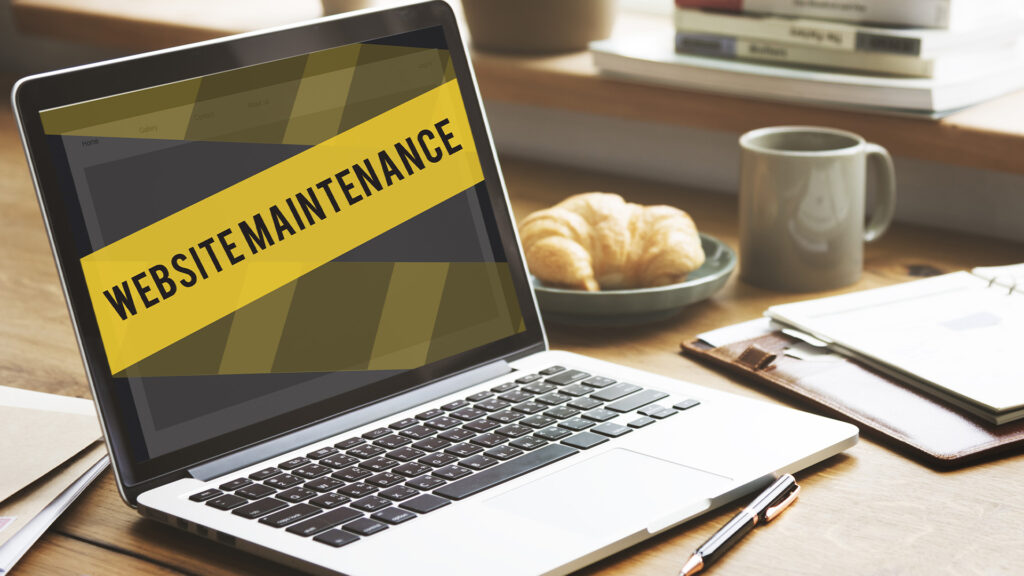
Keeping Your Website Up-To-Date: Why You Need Regular Maintenance
In the digital era, where first impressions are often made online, having a well-maintained website is crucial for any business or individual looking to make a mark. It’s not just about having a web presence; it’s about ensuring that presence works efficiently and effectively for you. This is precisely why you need regular maintenance for your website.
From theme and plugin updates to bolstering security measures, regular maintenance ensures that your site remains relevant, secure, and functional. Let’s dive into the many reasons maintaining your website isn’t just a good practice—it’s a necessity.
Understanding the Importance of Regular Website Maintenance
Just like maintaining optimal health requires regular doctor visits, a website needs consistent check-ups to ensure it’s performing as it should. This maintenance is more than just a facelift; it’s about keeping the engine running smoothly under the hood. Updating content keeps your message fresh and engaging for visitors, while checking and fixing broken links prevent frustration and ensure a seamless navigation experience. But the benefits extend further into the technical realm.
The continuous updating of software, including the CMS, themes, and plugins, is fundamental. This not only refines functionality but also fortifies your site’s defenses against cyber threats.
Keeping your digital storefront modern and operational is not just beneficial; it’s imperative for fostering trust and reliability among your audience. Visitors expect a frictionless experience, and search engines demand it—ranking those who adhere higher than those who neglect. The ripple effect of such diligence is vast, affecting everything from user satisfaction to search engine visibility.
Regular maintenance ensures your website stands as a bastion of relevancy and reliability in the fast-paced digital landscape, inviting both new and returning visitors to explore what you have to offer. Engaging in these practices keeps your site healthy and positions your digital presence on a trajectory for growth, innovation, and security.
The Significance of Keeping Your Themes Updated
In the ever-evolving landscape of the internet, your website’s theme is more than just a collection of aesthetic choices; it’s a crucial component that influences both user experience and site functionality. As digital trends and technologies advance, theme developers work tirelessly to adapt, providing updates that not only enhance visual appeal but also ensure compatibility with the latest online standards.
Neglecting these updates can lead to more than just a stale appearance; it can cause performance issues, affecting how quickly and efficiently your site operates.
Updated themes often come with optimizations that reduce loading times, an essential factor for retaining visitor interest and improving overall user experience.
Safe Guarding Your Website
Moreover, with the internet being an increasingly hostile environment, security is paramount. Updates frequently include fixes for vulnerabilities that could be exploited by malicious entities, offering an added layer of protection for your website and its visitors.
Implementing the latest theme updates is also a step toward ensuring that your site remains accessible to as wide an audience as possible. This includes compatibility with various browsers, devices, and screen sizes, from desktop monitors to smartphones. As accessibility standards evolve, theme updates help your site stay compliant, ensuring that everyone, regardless of ability, can access and navigate your website with ease.
By prioritizing the regular update of your website’s theme, you’re not just maintaining its current state; you’re preparing it for the future. This proactive approach helps safeguard your site’s integrity, secures a positive experience for your visitors, and supports your website’s continuous growth and adaptability in the digital realm.
The Crucial Role of Plugin Updates in Website Maintenance
Plugins serve as the functional backbone of many websites, empowering them with a broad spectrum of capabilities from enhancing SEO to facilitating better user engagement through social media feeds. Given their integral role, it’s paramount to keep these tools up-to-date. The process of updating plugins is not merely about accessing the latest features or improvements; it’s a critical step in safeguarding your website against potential security breaches and ensuring the seamless operation of its various functionalities.
When developers release new versions of plugins, these often include patches for security vulnerabilities that have been identified since the last update. By delaying or ignoring these updates, website owners inadvertently leave their digital doors open to hackers who are always on the lookout for weaknesses to exploit. Furthermore, compatibility issues may arise when plugins are not kept current. This could lead to malfunctioning features or, in the worst-case scenario, a complete website breakdown, significantly undermining user experience and trust.
Importance of Performance
In addition to security and compatibility considerations, plugin updates can also contribute to improved performance. Developers continuously refine their code to make plugins more efficient and less resource-intensive, which can, in turn, enhance the overall speed and responsiveness of your website—a factor that directly influences user satisfaction and SEO rankings.
Therefore, actively managing and updating your website’s plugins is not an optional task but a fundamental aspect of routine website maintenance. This vigilance not only protects your site but also ensures that it continues to function optimally, providing a safe and engaging environment for your visitors.

Enhancing Website Security Through Regular Maintenance
In the vast and ever-changing digital landscape, ensuring the security of your website is paramount. The cornerstone of safeguarding your online domain lies in diligent, regular maintenance practices. Cybercriminals tirelessly innovate ways to exploit vulnerabilities, making it essential to stay ahead with proactive security measures.
A critical step in this process is the timely application of updates. Each update to your CMS, themes, and plugins often includes vital security patches addressing newly discovered vulnerabilities, thus fortifying your site’s defenses.
Site Monitoring
Beyond updates, regular maintenance must include comprehensive site backups. Creating frequent, reliable backups ensures that, in the event of a security breach, you can restore your website to its pre-attack state, minimizing damage and downtime.
Monitoring your website for unusual activities is another crucial security measure. This involves checking for unexpected changes in your website’s files or spikes in traffic that could indicate a security issue, allowing for immediate action to mitigate any potential threats.
Implementing strong password policies and employing encryption, such as SSL certificates, also play a significant role in enhancing website security. These measures protect the integrity of user data and transactions, thereby reinforcing trust in your digital presence.
Together, these practices create a robust security framework that not only defends against current cyber threats but also prepares your website to withstand future challenges. Engaging in regular maintenance is not merely a defensive strategy; it is an essential investment in the credibility and resilience of your online presence.
The Impact of Maintenance on Search Engine Optimization (SEO)
Regular upkeep of your website plays a critical role in enhancing its search engine optimization (SEO). One of the pivotal ways maintenance influences SEO is through the positive effects of updates. When themes and plugins are kept current, they often bring improvements that directly contribute to site speed and responsiveness.
These are not minor enhancements; search engines heavily weigh these factors when determining rankings. A fast, responsive site offers a better user experience, something search engines aim to prioritize in their search results.
Benefits of Maintenance
Monitoring and fixing broken links is another maintenance activity that has SEO benefits. Broken links can significantly harm user experience and, as a consequence, damage your site’s SEO. Regular checks ensure users and search engine crawlers can navigate your site without encountering dead ends, thereby improving crawlability and, by extension, rankings.
Content is king in the SEO world, and regular maintenance includes updating and adding fresh content. This shows search engines that your site is active and provides up-to-date information, making it more likely to be considered a valuable resource. Such updates encourage search engines to crawl your site more frequently, increasing the chances of higher rankings.
In essence, each maintenance activity, from updates to content refreshes, signals to search engines that your website is a thriving, relevant, and secure resource. This not only aids in maintaining your current SEO standings but can also pave the way for higher rankings, driving more organic traffic to your site. Engaging in these regular maintenance practices demonstrates a commitment to quality and relevance, two cornerstones of effective SEO strategy.
Best Practices for Regular Website Maintenance
Embarking on the journey of routine website maintenance doesn’t have to feel like an uphill battle. By adopting a structured approach, you can streamline the process and ensure your site remains in top-notch condition. Here’s a distilled list of strategies to guide you:
- Establish a Maintenance Calendar: Dedicate specific times for checking and implementing updates for your website’s core systems, including the CMS, themes, and plugins. Depending on the size and complexity of your site, a monthly or quarterly check-in is advisable.
- Utilize Performance Monitoring Tools: Leverage available technologies to keep a pulse on your website’s operational status. Tools that analyze page speed, search for broken links, and monitor for downtime can be invaluable in preempting issues before they escalate.
- Implement Routine Backups: Before any update, ensure you have a recent backup. This safety net allows you to revert to a stable version of your site should an update not go as planned.
- Stay Up-to-Date with Industry News: Knowledge is power. By following updates from your CMS and plugin/theme developers, you’re better positioned to anticipate changes and react promptly to security advisories.
- Enlist Expert Assistance: Recognize when to bring in the experts. For those who find website maintenance overwhelming or those with sites too crucial to risk downtime, hiring a professional can be a wise decision. They can handle the intricacies of maintenance, allowing you to focus on your business or content.
By following these practices, you can demystify the process of website maintenance, keeping your digital presence secure, functional, and poised for success.
Need help becoming more relevant in the eyes of search engines and online customers?
The quality of our SEO services is unmatched, as proven by the numerous local service businesses and contractors we have as clients, all of whom are consistently appearing on the first page of Google nationwide
